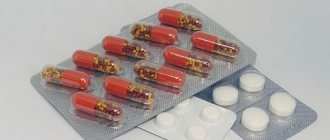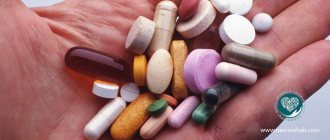Compound
| Dragee | 1 dragee |
| active substances: | |
| gentian root (Gentiana lutea) | 6 mg |
| primrose flowers (Primula veris) | 18 mg |
| sorrel grass (Rumex acetosa) | 18 mg |
| elderberry flowers (Sambucus nigra) | 18 mg |
| verbena herb (Verbena officinalis) | 18 mg |
| excipients: potato starch; colloidal silicon dioxide; purified water; lactose monohydrate; gelatin; sorbitol; stearic acid | |
| shell: calcium carbonate; glucose syrup; green varnish (E104, E132); yellow-green varnish (E104, E132); magnesium oxide; corn starch; dextrin; mountain glycol wax; sodium carbonate anhydrous; methyl methacrylate, dimethylaminoethyl methacrylate and butyl methacrylate copolymer; povidone K25; castor oil; sucrose; shellac; talc; titanium dioxide |
| Drops for oral administration | 100 g |
| active substances: | |
| hydroalcoholic extract | 29 g |
| it includes the following types of medicinal plant raw materials: | |
| gentian root (Gentiana lutea) | 0.2 g |
| primrose flowers (Primula veris) | 0.6 g |
| sorrel grass (Rumex acetosa) | 0.6 g |
| elderberry flowers (Sambucus nigra) | 0.6 g |
| verbena herb (Verbena officinalis) | 0.6 g |
| ethanol content - 16–19 vol.% | |
| excipients: purified water - 71 g |
Can Sinupret be used during pregnancy?
The drug has not been proven to have an aggressive and negative effect on the body of a pregnant woman and the unborn baby, therefore its use is not prohibited subject to a number of rules:
- Absence of severe chronic diseases.
- Use of Sinupret in tablet form. Syrup and drops cannot be used due to the presence of alcohol in the composition.
- Absence of allergies and individual hypersensitivity to the components of the drug.
Directions for use and doses
Inside.
The dragee should be swallowed whole, without chewing, with a small amount of water; drops for oral administration must first be diluted in a small amount of water.
Adults - 2 tablets or 50 drops 3 times a day; children from 2 to 6 years old - 15 drops 3 times a day; for school-age children - 25 drops or 1 tablet 3 times a day. Duration of treatment is 7–14 days.
If symptoms persist for more than 7–14 days or recur periodically, you should consult your doctor.
Contraindications and adverse reactions
You should avoid taking the drug in the form of drops in the following cases:
- epilepsy;
- liver diseases;
- brain diseases;
- alcoholism;
- period of lactation and childbearing.
The drug in tablets is contraindicated in the following cases:
- allergy to fructose and galactose;
- sucrase and lactase deficiency.
Taking the drug in any form is contraindicated in the presence of increased susceptibility to the constituent components. Do not give to children under 2 years of age (tablets up to 6 years of age).
In rare cases, after taking the drug, undesirable reactions from the digestive system may occur - pain in the abdominal area, vomiting, nausea. Allergies may also manifest themselves in the form of redness, itching and rashes on the skin. It is extremely rare that an allergic reaction is accompanied by shortness of breath and swelling of the face.
To date, no cases of drug overdose have been recorded.
special instructions
The drops for oral administration contain 16–19 vol.% ethanol.
When using the bottle, keep it in an upright position.
Shake Sinupret® drops before using.
During storage of the solution, slight turbidity or slight precipitation may occur, which does not affect the effectiveness of the drug.
Instructions for patients with diabetes: the digestible carbohydrates contained in one tablet are less than 0.03 XE.
Impact on the ability to drive vehicles and operate machinery. When used in recommended doses, the drug does not affect the speed of reaction when driving vehicles and machinery.
Composition of the drug Sinupret
The doctor observing the patient may prescribe the drug Sinupret. This is a combination medicine based on medicinal herbs.
Among the effects that Sinupret has are mucolytic, expectorant and anti-inflammatory. It is often prescribed for colds, sinusitis, sinusitis and sinusitis.
You can find Sinupret in the pharmacy in the form of tablets, oral drops and syrup. Sinupret tablets are prescribed to adults and children as a complex therapy if sinusitis is characterized by the presence of a viscous secretion. Drops and syrup are indicated for children and those who cannot take pills.
Plant components (verbena, primrose, sorrel, black elderberry, gentiana) are highly productive and work well together. This means that they effectively cope with swelling of the mucous membrane and nasal congestion, regulate secretions, normalize sinus ventilation, and stimulate drainage. Thus, Sinupret has a secretomotor, secretolytic and anti-inflammatory effect.
Since Sinupret is based on medicinal herbs, let's look at what effect you can expect from each of them.
Verbena normalizes metabolic processes. It works as a tonic, analgesic, and anti-inflammatory agent. As part of Sinupret, Verbena acts as a component that dilutes viscous secretions, relieves allergic reactions and works as an antispasmodic.
Primrose is included as a sedative, expectorant and antispasmodic. Primrose stimulates secretion, which means that phlegm is eliminated faster.
Sorrel in Sinupret to provide anti-allergic, wound-healing, hemostatic, antiseptic and anti-inflammatory effects.
Black elderberry eliminates swelling of the nasal mucosa. It has a disinfectant and, accordingly, anti-inflammatory effect.
Sinupret copes well with chronic rhinitis
Thus, the complex of herbs in the Sinupret medicine:
- reduces the viscosity of sputum;
- facilitates the process of sputum discharge;
- effectively clears the sinuses of secretions;
- eliminates bronchospasm;
- normalizes the protective function of the respiratory tract epithelium;
- acts as an antiviral and anti-inflammatory agent.
And Sinupret, due to its combined nature, enhances the effectiveness of antibiotic treatment.
Sinupret's plant base provides another important advantage. The drug acts gently, does not cause addiction and has a small list of adverse reactions of the body. Sinupret improves the body's resistance to viruses and bacteria, and is therefore especially recommended for patients with weakened immune systems.
Note!
Description of the drug Sinupret forte table. p/o No. 20 on this page is a simplified author’s version of the apteka911 website, created on the basis of the instructions for use.
Before purchasing or using the drug, you should consult your doctor and read the manufacturer's original instructions (attached to each package of the drug). Information about the drug is provided for informational purposes only and should not be used as a guide to self-medication. Only a doctor can decide to prescribe the drug, as well as determine the dose and methods of its use.
What diseases does Sinupret help with?
Homeopathic medicine is taken for acute and chronic diseases of the sinuses and tracheobronchitis, which are accompanied by inflammation and caused by bacteria or viruses.
Sinupret for sinusitis is an alternative to the use of antibiotics. Thanks to the antibacterial effect of the drug, the symptoms of inflammation are reduced, nasal breathing is restored, and the symptoms of sinusitis disappear within two weeks.
Taking the drug allows you to eliminate the toxic effect of medications in patients with weakened protective functions of the body and in patients for whom the safety of therapy is a priority.
Tablets for the common cold Sinupret drains the sinuses, eliminates mucus stagnation, inhibits the activity of viruses and reduces inflammation, facilitates breathing and prevents the disease from becoming chronic.
Sinupret for cough is used by adults and children for diseases that are accompanied by difficulty in sputum discharge. The drug eliminates the frequency of attacks of dry cough, which can cause suffocation, thins and removes thick mucus, which leads to a decrease in swelling and expansion of the lumen of the bronchi. As a result, metabolic processes in the respiratory tract are normalized, and the patient’s condition is alleviated.
Sinupret for adenoids slows down the growth of lymphoid tissue, has an antimicrobial effect, facilitates breathing through the nose and reduces the frequency of colds. The drug in drops and syrup is prescribed to children from 2 years of age for a month.
Side effects
Gastrointestinal disorders (eg, stomach pain, nausea, diarrhea, vomiting, abdominal discomfort) have been observed rarely. In rare cases, hypersensitivity reactions may occur, including rash, redness of the skin, itching, urticaria, Quincke's edema, shortness of breath, and swelling of the face.
If any adverse reactions occur, you should stop using the drug and be sure to consult a doctor.
At the first sign of a hypersensitivity/allergic reaction, you should not take this drug again.
Sinupret® forte
APPROVED Order of the Ministry of Health of Ukraine May 13, 2020 No. 1128 Registration Certificate No. UA/4373/04/01
INSTRUCTIONS for medical use of the drug SINUPRET ® FORTE (SINUPRET ® FORTE)
Composition of the medicinal product: 1 tablet contains: active ingredients: dried medicinal plants in powder form:
| sorrel herb (Herba Rumis) | 36 mg; |
| Verbena herbs (Nerba Verbenae) | 36 mg; |
| gentian root (Radix Gentianae) | 12 mg; |
| elderberry flowers (Flores Sambusi) | 36 mg; |
| primrose flowers with a calyx (Flores Рrimulae сum Сalyсіbus) | 36 mg; |
excipients: butyl methacrylate (2-dimethylaminomethacrylate)-methyl methacrylate copolymer 1:2:1 (MW 150000), purified water, montan glycol wax, glucose solution, gelatin, indigo carmine E 132, calcium carbonate E 170, stearic acid, potato starch, modified corn starch, anhydrous colloidal silicon dioxide, lactose monohydrate, light magnesium oxide, anhydrous sodium carbonate, refined ricin oil, povidone K 25, sucrose, sorbitol E 420, talc, titanium dioxide E 171, quinoline yellow E 104, shellac .
Dosage form. Film-coated tablets. Round, biconvex tablets, coated with a green color with a smooth surface.
Manufacturer's name and location. Bionorica SE, Kerchensteinerstrasse 11-15, 92318 Neumarkt, Germany.
Pharmacotherapeutic group. Other medications used for coughs and colds. ATC code R05X. The plant components that make up the drug have complex activity, which is manifested in secretolytic action, anti-inflammatory and decongestant effects.
Under the influence of the drug, secretion is regulated and tissue swelling is reduced. Drainage and ventilation of the paranasal sinuses are restored, nasal congestion is eliminated, and the protective function of the respiratory tract epithelium is normalized.
Indications. Acute and chronic inflammatory diseases of the paranasal sinuses (sinusitis and other sinusitis).
Contraindications. Increased individual sensitivity to any of the active or other components of the drug.
Special precautions. Due to the content of glucose, lactose, sucrose and sorbitol, the drug should not be taken by patients with hereditary intolerance to fructose, galactose, lactase deficiency, glucose-galactose malabsorption or sucrose-isomaltase deficiency. One film-coated tablet contains, on average, 0.03 bread units. Before using other medicines, seek the advice of your doctor.
Use during pregnancy or breastfeeding. During pregnancy or breastfeeding, the drug can be used only after the indications have been clearly established.
During the period of use of the drug Sinupret ® forte for several years, there is no data indicating a risk of using the drug during pregnancy or breastfeeding, therefore the drug is a safe drug. However, it should be prescribed only after assessing the ratio of benefit to the mother/risk to the fetus (child).
The ability to influence the reaction rate when driving a vehicle or working with other mechanisms. In recommended doses, the drug does not affect the ability to drive vehicles or operate machinery.
Children. Not used in children under 12 years of age due to lack of research.
Overdose. There are no known cases of overdose to date. An increase in these adverse reactions may occur.
Treatment of intoxication: if poisoning occurs or signs of overdose occur, symptomatic therapy is necessary.
Side effects. Gastrointestinal disturbances (stomach pain, nausea) are sometimes observed. Rarely, skin hypersensitivity reactions (rash, redness of the skin, itching), as well as severe allergic reactions (Quincke's edema, shortness of breath, swelling of the face) occur. If any adverse reactions occur, you should stop taking the drug and consult a doctor.
Interaction with other drugs and other types of interactions. There are currently no reports of interactions with other drugs.
Best before date. 3 years. Do not use after the expiration date indicated on the package.
Storage conditions. Store out of the reach of children, in the original packaging at a temperature not exceeding 30 °C.
Package. 20 or 25 tablets in a blister; 1 blister No. 20 (20x1) or 2 blisters No. 50 (25x2) or 4 blisters No. 100 (25x4) in a cardboard box.
Vacation category. Over the counter.






